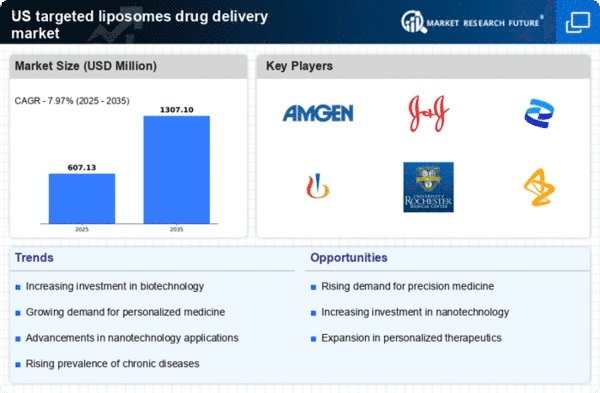Rising Demand for Targeted Therapies
The increasing prevalence of chronic diseases in the US is driving the demand for targeted therapies, which utilize advanced drug delivery systems. The targeted liposomes-drug-delivery market is experiencing growth as healthcare providers seek more effective treatment options. According to recent estimates, the market is projected to reach approximately $5 billion by 2027, reflecting a compound annual growth rate (CAGR) of around 10%. This trend indicates a shift towards precision medicine, where therapies are tailored to individual patient profiles, enhancing treatment efficacy and minimizing side effects. As patients and healthcare professionals become more aware of the benefits of targeted therapies, the adoption of liposomal drug delivery systems is likely to increase, further propelling the targeted liposomes-drug-delivery market forward.
Growing Investment in Biopharmaceuticals
The biopharmaceutical sector is experiencing robust growth, which is positively influencing the targeted liposomes-drug-delivery market. With an increasing number of biopharmaceutical companies focusing on developing novel therapies, the demand for effective drug delivery systems is on the rise. In 2025, biopharmaceuticals are expected to account for over 30% of the total pharmaceutical market in the US, highlighting the need for advanced delivery mechanisms. Targeted liposomes offer a promising solution for enhancing the delivery of biologics, such as monoclonal antibodies and RNA-based therapies. This trend suggests that the targeted liposomes-drug-delivery market will continue to expand as biopharmaceutical innovations emerge.
Regulatory Support for Advanced Therapies
Regulatory bodies in the US are increasingly supportive of innovative drug delivery systems, which is beneficial for the targeted liposomes-drug-delivery market. Initiatives aimed at expediting the approval process for novel therapies are encouraging pharmaceutical companies to invest in liposomal formulations. The FDA has introduced programs that facilitate faster review times for breakthrough therapies, which may lead to a more rapid introduction of targeted liposome-based treatments. This regulatory environment is likely to foster innovation and increase competition within the market, ultimately benefiting patients through improved access to advanced therapies.
Technological Advancements in Drug Delivery
Innovations in nanotechnology and drug formulation are significantly impacting the targeted liposomes-drug-delivery market. Recent advancements have led to the development of more efficient liposomal formulations that enhance drug stability and bioavailability. For instance, the incorporation of stimuli-responsive materials allows for controlled drug release, improving therapeutic outcomes. The market is witnessing a surge in research and development activities, with investments in technology expected to exceed $1 billion by 2026. These technological advancements not only improve the efficacy of existing drugs but also facilitate the development of new therapies, thereby expanding the scope of the targeted liposomes-drug-delivery market.
Increased Awareness of Drug Delivery Systems
There is a growing awareness among healthcare professionals and patients regarding the advantages of advanced drug delivery systems, particularly targeted liposomes. Educational initiatives and conferences are highlighting the benefits of these systems, which include improved drug efficacy and reduced side effects. As awareness increases, healthcare providers are more likely to adopt targeted liposome technologies in clinical practice. This shift is expected to drive market growth, as the targeted liposomes-drug-delivery market becomes more integrated into standard treatment protocols. The emphasis on patient-centered care further supports this trend, as targeted therapies align with the goals of personalized medicine.
















